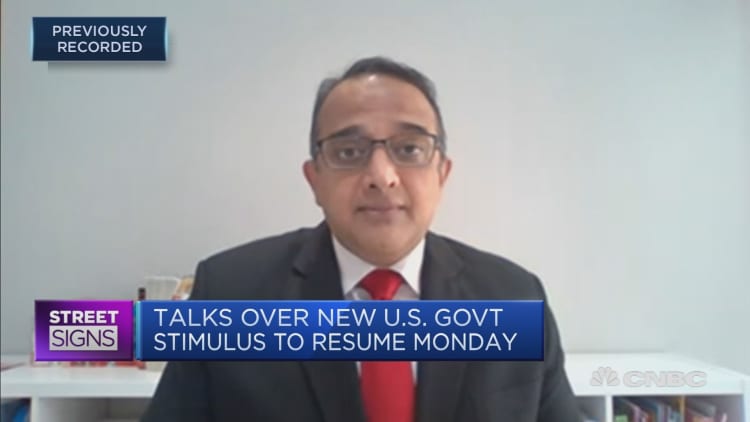
Stocks in Asia Pacific were mixed on Monday as U.S.-China tensions continue to heat up.
In Japan, the Nikkei 225 jumped 2.24% to close at 22,195.38, while the Topix index advanced 1.78% to end its trading day at 1,522.64. Those moves followed the nearly 3% tumble in Japanese stocks on Friday.
Mainland Chinese stocks were higher on the day, with the Shanghai composite up 1.75% to about 3,367.97 and the Shenzhen component rising 2.395% to around 13,964.56.
A private survey released Monday showed China's manufacturing activity expanded in July. The Caixin/Markit manufacturing Purchasing Manager's Index came in at 52.8 for July, above expectations for a reading of 51.3 by economists in a Reuters poll. PMI readings above 50 signify expansion, while those that fall below that figure indicate contraction.
The Hang Seng index in Hong Kong shed 0.56% to close at 24,458.13. Hong Kong-listed shares of HSBC sank more than 4% after the bank on Monday reported a 65% plunge in its pre-tax profits for the first six months of 2020.
South Korea's Kospi closed fractionally higher at 2,251.04. Over in Australia, the S&P/ASX 200 ended its trading day below the flatline at 5,926.10.
In Southeast Asia, the Straits Times index in Singapore fell 1.86% in afternoon trade.
Overall, the MSCI Asia ex-Japan index shed 0.42%.
Tensions between Washington and Beijing likely continued being watched by investors, with U.S. Secretary of State Mike Pompeo saying Sunday that U.S. President Donald Trump is set to announce "in the coming days" new actions related to Chinese software companies viewed by his administration as a national security threat.
On Friday, Trump told reporters he will act soon to ban Chinese-owned video app TikTok from the U.S., according to NBC News. Microsoft on Sunday confirmed it has held talks to buy TikTok in the U.S. from Chinese tech firm ByteDance.
Mizuho Bank's Vishnu Varathan wrote in a Monday note that a sale of TikTok's U.S. operations to Microsoft would be a "hollow relief if not a mere distraction."
"It is certainly not a resolution of growing US-China animosity that may be tick-tocking to a more open conflict," said Varathan, who is head of economics and strategy at the firm.
"I think the month of August is going to be another volatile month," OCBC Bank's Vasu Menon told CNBC's "Street Signs" on Monday.
Menon, who is executive director of investment strategy, wealth management Singapore at OCBC Bank, cited factors such as U.S.-China tension as well as upcoming economic data releases that are expected to bring a "mix of good news and bad news" as factors behind his view. He added that investors should brace themselves for "very choppy markets."
The U.S. dollar index, which tracks the greenback against a basket of its peers, was at 93.506 after bouncing from levels below 93 late last week.
The Japanese yen traded at 105.82 per dollar after weakening sharply from levels below 105 against the greenback late in the previous trading week. The Australian dollar changed hands at $0.7117 after slipping from levels above $0.72 last week.
Oil prices slipped in the afternoon of Asian trading hours, with international benchmark Brent crude futures down 0.94% to $43.11 per barrel. U.S. crude futures also fell 1.17% to $39.80 per barrel.


